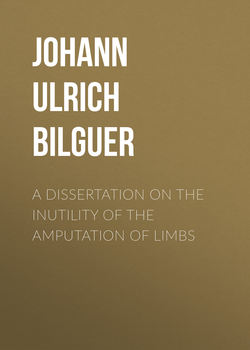Читать книгу A dissertation on the inutility of the amputation of limbs - Johann Ulrich Bilguer - Страница 10
SECT. VII
ОглавлениеI shall begin with an account of the means I make use of, internal as well as external, when a limb is mortified, the effects of which have convinced me, that in such cases amputation is not necessary; and here I shall first gratify the curiosity of those readers who, doubtless, are desirous to know what I have learned from the extensive opportunities I must necessarily have had, with respect to the use of the Peruvian bark.
Experience has taught me, that this admirable medicine is possessed of a singular and specific virtue in mortifications.
I know that several physicians and surgeons only recommend it in those which proceed from weakness. I have heard it reported by others, that they found it of little service after the famous battle of Dettingen6. But perhaps the other circumstances, with regard to the treatment of the patient, did not contribute to promote those good effects which I always observed attended it when judiciously administered. And I make no doubt, but every practitioner who, in prescribing it in cases of mortification, observes the rules laid down by Dr. Pringle, Dickins, Wade, Cheselden, Douglas, Rushworth, Amyand, Shipton and some others, will find it very efficacious. I do not mean, nevertheless, that it should be considered as the only internal medicine; there are, doubtless, other bitters which are sometimes extremely proper on these occasions. I must add, that the bark appears to me to possess that quality which Celsus requires in medicines, whether in a solid or liquid form, adapted to the cure of a mortification, to bind the belly moderately, and brace the whole system. After having treated of the external applications, I shall point out the method in which I administered the bark.
6
Mr. Ranby, however, who was one of the surgeons of the British troops at the time of the battle of Dettingen, lays great stress upon the bark: It is true, that in one of his cases, having ordered it to an officer of seventy years of age, whose leg had been amputated, on account of his ancle, with the neighbouring parts, having been terribly shattered by a cannon ball, it did not keep the sore from growing worse, or prevent the patient's death. But that we may form a just estimate of the merit of the bark, and the effects of amputation at the same time, it will be necessary to compare this case with the one which precedes it. This comparison will, I imagine, be of use. – I shall quote the author's own words. “An Austrian officer, who had his hand miserably shattered by a cannon ball, was, by some accident, left in a wood near the field of battle, destitute of any manner of help, from Thursday till the Sunday following, when he was brought to Hanau. The next morning I was carried to see him, and to assist in taking off his arm. On viewing it, I found it mortified almost to the elbow, with a great swelling and inflammation quite up to the shoulder. As it was by no means adviseable to attempt an amputation in such circumstances, I proposed giving him the bark; which being no ways objected to, he entered upon immediately. The next day he was rather better: But, on the third, was evidently so. The inflammation was less, the swelling began to subside, and the edges of the mortification were separating. The arm was fomented and wrapped up in the oatmeal and stale beer poultice, with theriaca: And the dreadful symptoms which forbad the operation, were now so much abated, that his surgeons did not at all hesitate to take it off. But this was done to very little purpose; for three or four days after the amputation, being attacked with convulsions, he expired.”
I shall here subjoin five questions.
Would Mr. Bilguer have amputated in these two instances?
Would not his method have saved both these patients, especially the last?
Does not amputation seem to have contributed to their death?
Does it not evidently appear, that in the latter of these two cases, amputation destroyed the good effects of the bark, which seemed to conduct the patient to a speedy cure; and that in the former case, the bark had not power sufficient to repair the mischief occasioned by the amputation?
Does it not follow from these two observations, that however salutary the effects of the bark may be, those of amputation are hurtful in a greater degree? Tissot.
